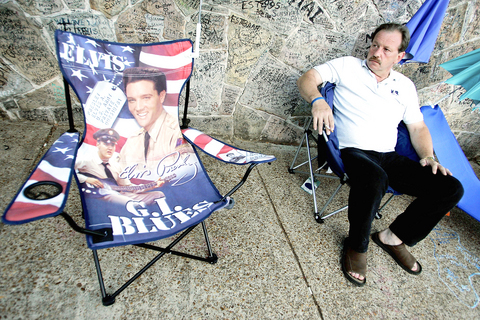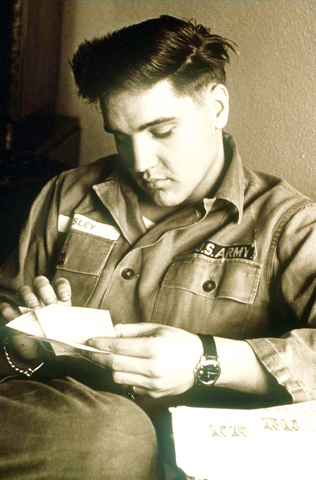In Memphis they call it "Death Week," the once-yearly festival when fans in sequined jumpsuits and blue suede shoes come to revel in the memory of the rock-and-roll king Elvis Presley, who died 28 years ago today.
Up to 30,000 tourists flock each year to Presley's former home for Elvis Week, the official name, celebrating the singer who swept the US like a storm in the mid-1950s with hits like Hound Dog and Love Me Tender.
Decades after he died at 42 in Memphis from heart failure in 1977, he remains a huge star, with fans joining Elvis impersonator contests and holding a candlelight vigil -- televised live as the Vigilcast -- at the famous gates of his Graceland mansion.

PHOTOS: AP
For this year's Elvis Week, some six-dozen wanna-be Presleys from the US, Puerto Rico, Canada, England, Spain and Japan will square off in the most prominent of the city's Elvis impersonator competitions, the week-long "Images of the King."
Launched by former Presley family veterinarian Edward "Doc" Franklin and his wife Jackie, the contest is one of the hallmark events of the annual festival.
Most of those flocking to Memphis for the celebration are like Sally Morgan, an Elvis fan from Cincinnati, Ohio, who has made the trek for five years.

"This is my vacation," says Morgan, at 24 not even alive when Presley died. Dressed in skintight blue jeans, Morgan sports Elvis' trademark "TCB" tattooed in the small of her back, for "Taking Care of Business," the name he gave his band. "I come to see the [Elvis performers] and go to the vigil. I like Memphis a lot -- all that I get around to, which is mostly Elvis stuff."
"Stuff" for Morgan includes Graceland, Presley's first apartment, Sun Studio where he first recorded, and the impersonator contest.
If visitors only see Elvis when they come to Memphis, local Memphians are less than elated by the annual party for their most famous resident, which they renamed "Death Week."
Local radio stations don't play his music during Elvis Week, nor much during the rest of the year.
"People outside Memphis see us on TV during Elvis Week and they think everyone here is like this all the time," says Jackie Franklin.
"People don't know almost all those involved in the contest are not even from here," she says.
"Actually, most of the people who go to see the contest are not from here," Franklin adds.
Locals like Chris Gordon set a mental perimeter around Graceland during "Death Week" and stay away.
"Like many Memphians, my wife and I are not Elvis fans," said Gordon. "We don't attend any events and give [Graceland] a wide berth."
"Through Labor Day, we gene-rally deny we are even residents," he added.
Some Memphians are chafed by the fact that Presley has largely defined the Memphis image for those outside it, despite the majority-black city's other stars like Al Green, Aretha Franklin, Isaac Hayes, Ike and Tina Turner, and another "king", blues legend B.B. King.
Outside of the Elvis hits piped into the airport, visitors will be hard-pressed to hear his music around the city.
At irreverent parties like the "Dead Elvis Ball," an annual party for nearly 25 years, locals prefer to mock Presley's caricature.
Saturday night, they sought refuge from the annual Elvis storm at the party, while mercilessley donning cheap, buffoonish polyester Elvis jumpsuits and T-Shirts with slogans like "Elvis is dead! Get over it!"
The rhythm and blues band played a kaleidoscope of covers from Wilson Pickett to Van Morrison with the only foray into Presley territory at the end of the night -- and that a farcical take on Elvis' life.
But the locals are in denial, for Elvis is still the city's biggest tourist draw, especially during Elvis Week.
And last year the king topped Forbes' list for dead celebrity earners, while Presley re-releases and remixes have in the past three years topped American and British music charts.

In the next few months tough decisions will need to be made by the Taiwan People’s Party (TPP) and their pan-blue allies in the Chinese Nationalist Party (KMT). It will reveal just how real their alliance is with actual power at stake. Party founder Ko Wen-je (柯文哲) faced these tough questions, which we explored in part one of this series, “Ko Wen-je, the KMT’s prickly ally,” (Aug. 16, page 12). Ko was open to cooperation, but on his terms. He openly fretted about being “swallowed up” by the KMT, and was keenly aware of the experience of the People’s First Party

Aug. 25 to Aug. 31 Although Mr. Lin (林) had been married to his Japanese wife for a decade, their union was never legally recognized — and even their daughter was officially deemed illegitimate. During the first half of Japanese rule in Taiwan, only marriages between Japanese men and Taiwanese women were valid, unless the Taiwanese husband formally joined a Japanese household. In 1920, Lin took his frustrations directly to the Ministry of Home Affairs: “Since Japan took possession of Taiwan, we have obeyed the government’s directives and committed ourselves to breaking old Qing-era customs. Yet ... our marriages remain unrecognized,

Not long into Mistress Dispeller, a quietly jaw-dropping new documentary from director Elizabeth Lo, the film’s eponymous character lays out her thesis for ridding marriages of troublesome extra lovers. “When someone becomes a mistress,” she says, “it’s because they feel they don’t deserve complete love. She’s the one who needs our help the most.” Wang Zhenxi, a mistress dispeller based in north-central China’s Henan province, is one of a growing number of self-styled professionals who earn a living by intervening in people’s marriages — to “dispel” them of intruders. “I was looking for a love story set in China,” says Lo,

During the Metal Ages, prior to the arrival of the Dutch and Chinese, a great shift took place in indigenous material culture. Glass and agate beads, introduced after 400BC, completely replaced Taiwanese nephrite (jade) as the ornamental materials of choice, anthropologist Liu Jiun-Yu (劉俊昱) of the University of Washington wrote in a 2023 article. He added of the island’s modern indigenous peoples: “They are the descendants of prehistoric Formosans but have no nephrite-using cultures.” Moderns squint at that dynamic era of trade and cultural change through the mutually supporting lenses of later settler-colonialism and imperial power, which treated the indigenous as